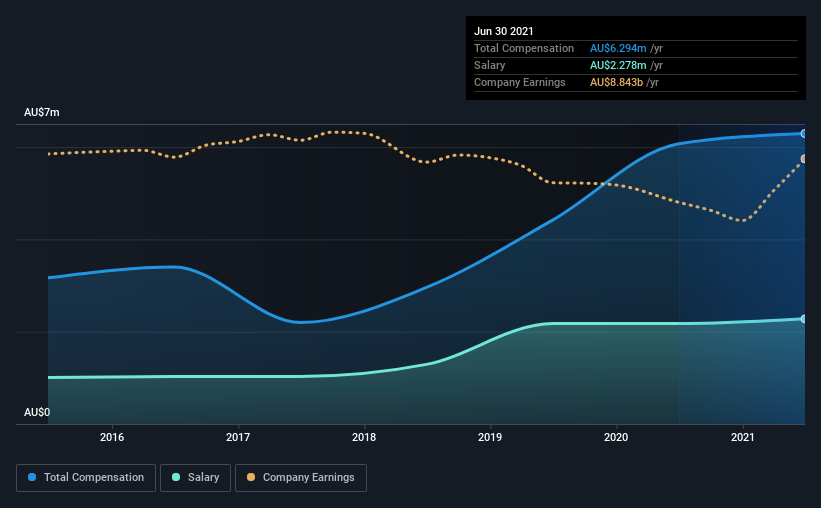Shareholders Will Probably Hold Off On Increasing Commonwealth Bank of Australia's (ASX:CBA) CEO Compensation For The Time Being
Performance at Commonwealth Bank of Australia (ASX:CBA) has been reasonably good and CEO Matt Comyn has done a decent job of steering the company in the right direction. This is something shareholders will keep in mind as they cast their votes on company resolutions such as executive remuneration in the upcoming AGM on 12 October 2021. However, some shareholders will still be cautious of paying the CEO excessively.
See our latest analysis for Commonwealth Bank of Australia
Comparing Commonwealth Bank of Australia's CEO Compensation With the industry
At the time of writing, our data shows that Commonwealth Bank of Australia has a market capitalization of AU$176b, and reported total annual CEO compensation of AU$6.3m for the year to June 2021. That's a fairly small increase of 3.6% over the previous year. While this analysis focuses on total compensation, it's worth acknowledging that the salary portion is lower, valued at AU$2.3m.
On comparing similar companies in the industry with market capitalizations above AU$11b, we found that the median total CEO compensation was AU$3.2m. This suggests that Matt Comyn is paid more than the median for the industry. What's more, Matt Comyn holds AU$11m worth of shares in the company in their own name, indicating that they have a lot of skin in the game.
Component | 2021 | 2020 | Proportion (2021) |
Salary | AU$2.3m | AU$2.2m | 36% |
Other | AU$4.0m | AU$3.9m | 64% |
Total Compensation | AU$6.3m | AU$6.1m | 100% |
On an industry level, around 68% of total compensation represents salary and 32% is other remuneration. Commonwealth Bank of Australia pays a modest slice of remuneration through salary, as compared to the broader industry. If total compensation is slanted towards non-salary benefits, it indicates that CEO pay is linked to company performance.
Commonwealth Bank of Australia's Growth
Commonwealth Bank of Australia's earnings per share (EPS) grew 1.2% per year over the last three years. Its revenue is up 11% over the last year.
This revenue growth could really point to a brighter future. And, while modest, the EPS growth is noticeable. So while we'd stop just short of calling this a top performer, but we think it is well worth watching. Looking ahead, you might want to check this free visual report on analyst forecasts for the company's future earnings..
Has Commonwealth Bank of Australia Been A Good Investment?
Boasting a total shareholder return of 76% over three years, Commonwealth Bank of Australia has done well by shareholders. As a result, some may believe the CEO should be paid more than is normal for companies of similar size.
To Conclude...
Given that the company's overall performance has been reasonable, the CEO remuneration policy might not be shareholders' central point of focus in the upcoming AGM. However, any decision to raise CEO pay might be met with some objections from the shareholders given that the CEO is already paid higher than the industry average.
While CEO pay is an important factor to be aware of, there are other areas that investors should be mindful of as well. We did our research and spotted 1 warning sign for Commonwealth Bank of Australia that investors should look into moving forward.
Switching gears from Commonwealth Bank of Australia, if you're hunting for a pristine balance sheet and premium returns, this free list of high return, low debt companies is a great place to look.
This article by Simply Wall St is general in nature. We provide commentary based on historical data and analyst forecasts only using an unbiased methodology and our articles are not intended to be financial advice. It does not constitute a recommendation to buy or sell any stock, and does not take account of your objectives, or your financial situation. We aim to bring you long-term focused analysis driven by fundamental data. Note that our analysis may not factor in the latest price-sensitive company announcements or qualitative material. Simply Wall St has no position in any stocks mentioned.
Have feedback on this article? Concerned about the content? Get in touch with us directly. Alternatively, email editorial-team (at) simplywallst.com.

 Yahoo Finance
Yahoo Finance 
